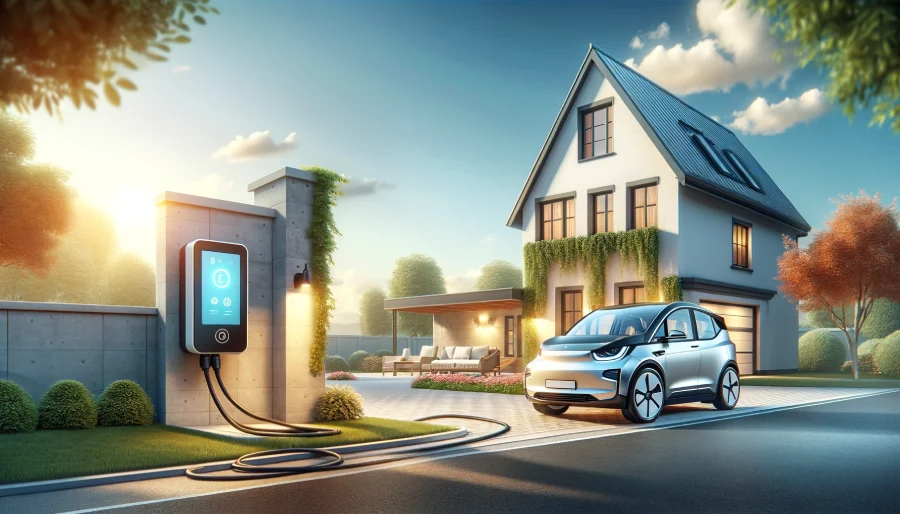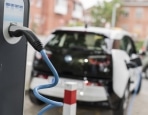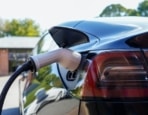For homeowners or business owners in Greater Vancouver, BC, looking to install an EV charger, there are several key aspects to consider, including different types of chargers, electrical infrastructure needs, applicable bylaws and regulations, and the costs and benefits of installation.
Types of EV Chargers
For EV charger home installation, there are primarily two types of EV chargers:
- Level 1 Chargers: These use a standard 120V household outlet. They are slower, typically adding about 2-5 miles of range per hour of charging. They are suitable for overnight charging or for vehicles with smaller batteries.
- Level 2 Chargers: These require a 240V supply, similar to what large appliances use. They offer faster charging, typically adding about 10-60 miles of range per hour. Level 2 chargers are more common for home installations due to their efficiency.
The main differences between these two types are their charging speed and electrical requirements. Level 1 chargers are slower but don’t usually require electrical upgrades, while Level 2 chargers are faster but may require the installation of additional electrical infrastructure.
Business owners may want to consider Level 3 Chargers: Also known as DC fast chargers, these are not widely compatible with all vehicles and are less common in residential settings. They offer rapid charging, up to 170 miles of range in just 30 minutes.
Some issues to consider when installing an EV Charger
Be sure to consider these points if you are a Vancouver homeowner considering an EV charger installation:
- Connector Type: Different EVs may require different types of connectors. Ensure the charger’s connector matches your vehicle’s specifications.
- Port Options: Chargers can have single or dual ports. Single-port chargers can charge one vehicle at a time, whereas dual-port chargers can charge two vehicles simultaneously if there’s enough electrical capacity.
- Cord Length: The length of the charging cord impacts convenience. Longer cords provide more flexibility in parking, but shorter cords are easier to store.
- Indoor/Outdoor Installation: Chargers can be designed for indoor or outdoor use. Outdoor chargers should be weather-resistant to handle rain, snow, and temperature variations.
- Portability: Chargers can be portable or permanently installed. Portable chargers offer flexibility and can be used at different locations, while permanent installations are more robust and secure.
- Amperage: Higher amperage chargers provide faster charging speeds. It’s important to balance the need for speed with the electrical capacity of your home.
- Smart Chargers: These chargers optimize electricity use and charging times, potentially reducing costs and improving efficiency.
- Networked Chargers: Networked chargers connect to the internet, allowing remote monitoring and control of the charging process, often through a smartphone app.
Each of these considerations is crucial in selecting the right charger for your needs and ensuring compatibility with your home’s infrastructure and your electric vehicle. In addition, you should consider the following points carefully.
Electrical Infrastructure Needs
Before installation, it’s crucial to assess the electrical capacity of the property. This involves reviewing past electricity usage and may require upgrading electrical services or installing an EV power management device. Professional assessment by a qualified electrician is recommended and can be performed by a skilled Red Ryno Energy electrician.
Permits and Regulations for EV Charger Installation
In Vancouver, while no specific EV permits are required for retrofitting homes, a valid electrical permit is necessary. A qualified professional must conduct the work. For installations in strata or apartment buildings, additional steps such as getting permission from the building owner or strata council are required.
Costs and Rebates
The cost of an EV charger installation varies depending on the type of charger and any required electrical upgrades. Once we have completed a site inspection and discussed options your Red Ryno representative will be happy to provide a quote based on your needs.
There are rebates available to help offset these costs:
– Up to $350 for installing a Level 2 charging station in a single-family home.
– Up to $2,000 per charger for strata and businesses, along with additional support services.
For multi-unit rental buildings, there are top-up incentive programs available from the city. Moreover, the Province of BC and the Government of Canada offer various rebate programs for home charging upgrades.
Ongoing Maintenance
Regular maintenance of the charger and its connections is important to ensure they remain in good working condition. This includes checking for wear and tear and cleaning connectors.
In conclusion, installing an EV charger in Greater Vancouver requires careful consideration of charger types, electrical capacity, regulations, costs, and ongoing maintenance. Taking advantage of available rebates can significantly reduce the installation costs. It’s advisable to consult with professionals to ensure a smooth installation process.
For more detailed information, you can visit BC Hydro’s guide on EV Charger Installation, or the City of Vancouver’s electric vehicle page. Or contact our certified EV installation experts at Red Ryno Energy.



